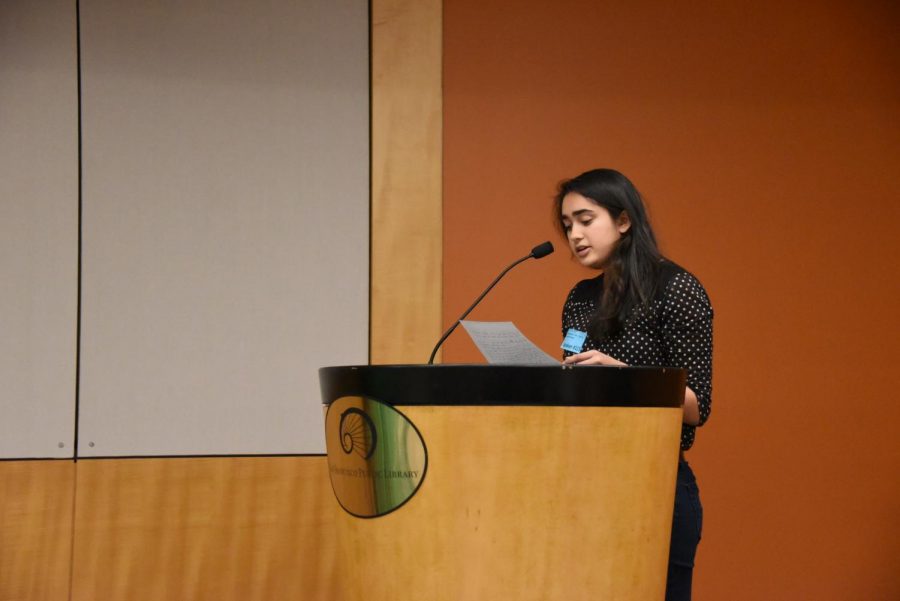Students speak against CPP repeal at EPA hearing
Satchi Thockchom (12) speaks at the EPA hearing about the CPP repeal at San Francisco on Wednesday. The CPP targets the reduction of greenhouse gas emissions from coal-burning at electricity power plants.
March 2, 2018
Seven Harker upper school students spoke at the the Environmental Protection Agency (EPA) listening session on the proposed repeal of the Clean Power Plan (CPP) this Wednesday at San Francisco.
Freshman Akshay Manglik; sophomores Jai Bahri, Anvi Banga, Avi Gulati, Alex Shing and Anthony Shing and senior Satchi Thockchom presented their statements at the San Francisco listening. The public hearing centered around the the proposal to repeal the CPP, which aims to lower greenhouse gas emissions, especially those produced in coal-burning electrical power plants.
Following the President’s Energy Independence Executive Order, the EPA proposed on Oct. 16 last year to repeal the CPP. EPA administrator Scott Pruitt officially signed a notice to review the plan on Mar. 28.
The speakers from Harker, like many other citizens, do not support the repeal of the CPP, believing that it offers measures crucial to the protection of the environment and the expansion of clean energy in the future.
“If Hurricane Harvey and the California wildfires were wakeup calls to our nation that our fragile environment needs fixing now, then the phone is still ringing. And a crucial policy that can answer that call is the Clean Power Plan,” said Avi.
However, according to the EPA, the CPP created under President Obama’s administration includes regulations that exceed EPA authority, and that it contains points that clash with the Clean Air Act. In addition, its repeal would also save up to $33 billion in costs in 2030.
The EPA is holding listening sessions in Kansas City, Missouri and Gillette, Wyoming, and has extended the public commenting period through April 26. Anyone interested can submit a comment identifiable by the Docket ID “EPA-HQ-OAR-2017-0355” via the website, email or fax (202-566-9744).


















![“[Building nerf blasters] became this outlet of creativity for me that hasn't been matched by anything else. The process [of] making a build complete to your desire is such a painstakingly difficult process, but I've had to learn from [the skills needed from] soldering to proper painting. There's so many different options for everything, if you think about it, it exists. The best part is [that] if it doesn't exist, you can build it yourself," Ishaan Parate said.](https://harkeraquila.com/wp-content/uploads/2022/08/DSC_8149-900x604.jpg)




![“When I came into high school, I was ready to be a follower. But DECA was a game changer for me. It helped me overcome my fear of public speaking, and it's played such a major role in who I've become today. To be able to successfully lead a chapter of 150 students, an officer team and be one of the upperclassmen I once really admired is something I'm [really] proud of,” Anvitha Tummala ('21) said.](https://harkeraquila.com/wp-content/uploads/2021/07/Screen-Shot-2021-07-25-at-9.50.05-AM-900x594.png)







![“I think getting up in the morning and having a sense of purpose [is exciting]. I think without a certain amount of drive, life is kind of obsolete and mundane, and I think having that every single day is what makes each day unique and kind of makes life exciting,” Neymika Jain (12) said.](https://harkeraquila.com/wp-content/uploads/2017/06/Screen-Shot-2017-06-03-at-4.54.16-PM.png)








![“My slogan is ‘slow feet, don’t eat, and I’m hungry.’ You need to run fast to get where you are–you aren't going to get those championships if you aren't fast,” Angel Cervantes (12) said. “I want to do well in school on my tests and in track and win championships for my team. I live by that, [and] I can do that anywhere: in the classroom or on the field.”](https://harkeraquila.com/wp-content/uploads/2018/06/DSC5146-900x601.jpg)
![“[Volleyball has] taught me how to fall correctly, and another thing it taught is that you don’t have to be the best at something to be good at it. If you just hit the ball in a smart way, then it still scores points and you’re good at it. You could be a background player and still make a much bigger impact on the team than you would think,” Anya Gert (’20) said.](https://harkeraquila.com/wp-content/uploads/2020/06/AnnaGert_JinTuan_HoHPhotoEdited-600x900.jpeg)

![“I'm not nearly there yet, but [my confidence has] definitely been getting better since I was pretty shy and timid coming into Harker my freshman year. I know that there's a lot of people that are really confident in what they do, and I really admire them. Everyone's so driven and that has really pushed me to kind of try to find my own place in high school and be more confident,” Alyssa Huang (’20) said.](https://harkeraquila.com/wp-content/uploads/2020/06/AlyssaHuang_EmilyChen_HoHPhoto-900x749.jpeg)









